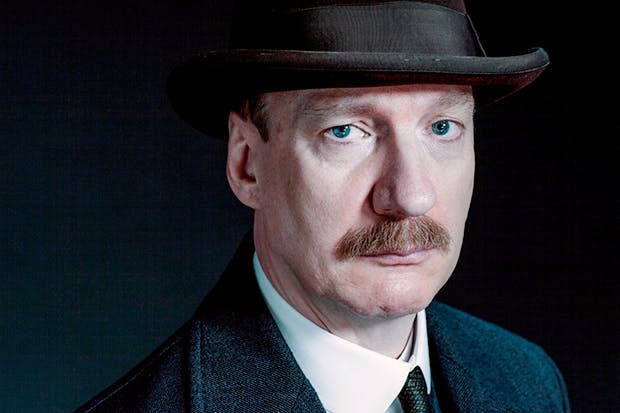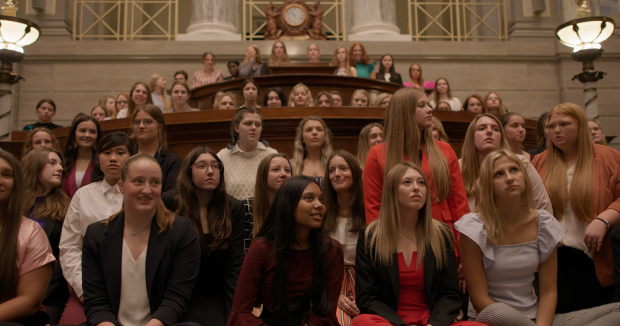What a load of manipulative, hysterical tosh is An Inspector Calls. It wasn’t a work with which I was familiar till I saw the latest TV adaptation. Now, of course, I see exactly why the luvvies — see, for example, Stephen Daldry’s highly acclaimed early 1990s National Theatre revival — adore it so. It confirms everything they think they know about the world: rich people bad, heartless, oppressive; poor people the long-suffering and saintly salt of the earth.
In case you’ve not had the pleasure, J.B. Priestley’s play is like a socialist game of Cluedo: a lovely innocent young working-class woman has died and the toffs all dunnit. Self-made millionaire mill-owner Arthur Birling bludgeoned her with his ruthless capitalism; Mrs Birling with her hypocritical sanctimoniousness; young Sheila Birling with her hysterical upper-middle-class insecurity; Sheila’s betrothed, Gerald Croft, with lasciviousness dressed up as human sympathy.
Then young Eric Birling, the drunken son and heir, finished her off by borderline-raping her and impregnating her with a child for which he neglected his responsibility. All right, so they didn’t literally kill her — she drank bleach — but they might just as well have done. As the mysterious nocturnal visitor Inspector Goole makes abundantly clear, this is a case of murder.
You can see, too, why it has become a standard GCSE text. Not only are its politics perfectly aligned with those of the teaching profession but there are so many big themes to explore, so many dramatic coups-de-théâtre at which to marvel. That Inspector, for example. As his name subtly indicates, he’s a supernatural figure: a red avenger from the netherworld come to strike a blow for social justice in a callous world ripe for righteous retribution.
Being a prescient sort of fellow, the Inspector knows — the play being set in 1912 — that that righteous retribution lies but two years hence. Prescient but not omniscient. What he doesn’t seem to be aware of (odd, given that his creator served in the trenches, first with the ranks, later as an officer) is the disproportionate burden of sacrifice that will fall on those despised public-school classes. (Eric, we can infer, is definitely for the chop; as is Gerald, whose father is a lord.)
Or perhaps he does know and thinks it’s a jolly good thing. If so, then I don’t think that reflects very well on J.B. Priestley, who, it is often said, created the Inspector as his mouthpiece. By the time of the second world war, when he wrote the play, Priestley had become a national treasure. A pretty repellent view for a national treasure to hold and to celebrate in a potboiling drama, if you ask me: those bloody toffs, they had it all coming.
Mind you, I’m not sure even Priestley himself would have guessed that his weird melodrama would have become such a standard of dramatic literature. Not least given its tragically dreadful implausibility. Five members of the same family, all with a hand in this random girl’s death? Pull the other one. As for the nonsense with the Inspector’s ludicrous investigation, whose purpose has less to do with inquiry than with delivering portentous moral judgments: it’s so unprofessional and impertinent that Arthur Birling would have seen him off the premises in five minutes, not waited an hour before belatedly realising, ‘That inspector didn’t half ask some funny questions.’
But for all that, it’s amazing how intensely it grips and compels. Once you forget the implausibilities — which you do quite often — you cannot help but be sucked into the emotional maelstrom. Yes, the set-up is almost embarrassingly schematic, oppressively didactic, risibly contrived, but the characters and their relationships (domineering father, feckless son, indulgent mother), though clichéd, are persuasively drawn. It’s an actors’ play — every part meaty, with hidden depths, requiring hugely satisfying shifts of mood. Another reason why the luvvies love it so.
Boy, do they inhabit those roles. They did in this TV production anyway: David Thewlis as the Inspector; Ken Stott as Mr Birling; Miranda Richardson as Mrs; etc. It’s quite invidious to name names when the entire cast was so good. They believed in their characters — even when required to do crap things like get an innocent shopgirl sacked on a toffee-nosed whim — and so, thanks to their conviction, did you.
The play, though, does not deserve this reverence. It’s poisonous, revisionist propaganda on a par with that of Barbara and John Lawrence Hammond, the northern bourgeois liberals who, in the wake of Engels and Toynbee, invented the popular modern notion of the industrial revolution as the bad thing it simply wasn’t. Most serious historians now recognise that for people like Eva —the play’s suicide victim — the owners of dark satanic mills like Birling’s generally did far more good than harm. If the public still often doesn’t, then it’s those celebrity purveyors of cast-iron bollocks like J.B. bloody Priestley we have to thank.
Got something to add? Join the discussion and comment below.
Get 10 issues for just $10
Subscribe to The Spectator Australia today for the next 10 magazine issues, plus full online access, for just $10.















Comments
Don't miss out
Join the conversation with other Spectator Australia readers. Subscribe to leave a comment.
SUBSCRIBEAlready a subscriber? Log in